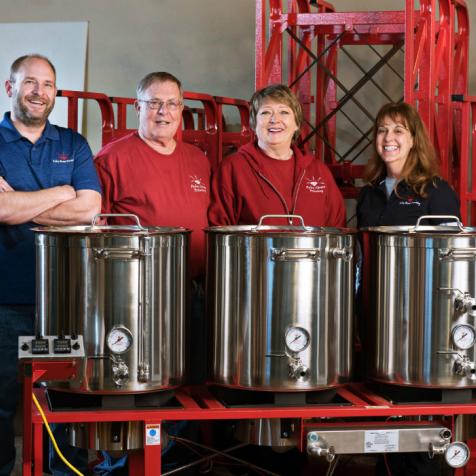
Company Details
Location
Fort Collins, Colorado
Founded
2011
Ownership Type
Private
Employees
4
Products
Brewing systems
Founder Brian Mollohan builds handcrafted brew systems that emphasize quality over quantity.
After working in the brokerage business for food and hardware for 20 years, Mollohan "was ready for a corporate escape," he says. "Basically, I've always wanted to be self-employed. At one point, I was thinking about opening a brewery."
That idea was rooted in Mollohan's homebrewing hobby that earned his residence the nickname, the Ruby Street Brewery, after its address. His wife, Bobbi, opened his eyes to another entrepreneurial option: manufacturing brew systems. "My wife made me realize I was a brewing equipment junkie," says Mollohan. "I probably never brewed two beers on the same brewery. We would brew a beer and build a new brewery."
In other words, he adds, " You could say our business was a hobby that got out of control."

Homebrewing gave way to manufacturing. "We actually launched out of my garage," says Mollohan. "We built them out of my garage and driveway for the first year."
The catalog started with the 10-gallon Ruby Street Brewery and the initial target market was homebrewers looking for a Cadillac system.
"We realized there was more demand from commercial brewers," says Mollohan. "The business changed six months in. Today, 75 percent of our sales are commercial sales."
That means bigger and better gas-fired and electric systems, but not too big, as most commercial customers use Ruby Street's systems for recipe development and small-batch experimentalism. Released in 2014, the Alpha Ruby is available in one- or two-barrel (31- or 62-gallon) configurations.

Complete systems range in price from $2,600 to about $10,000.
Ruby Street's innovation is all about functionality. "The bulk of it is what I would call intuitive design," says Mollohan. "We really spend time looking at how someone uses a brewery, how they work, where they stand."
One customer, a homebrewer who uses a wheelchair, spent a day at Ruby Street's fabrication shop so the system could be tailored to his needs.
Mollohan says the majority of systems are tweaked in one way or another. "It's not a packaged product," he explains. "Almost everything that comes out of her is 100 percent built to order."

Sometimes innovation can be a detriment to the end user. "We strive to avoid automation in our equipment," says Mollohan. "Brewers are like chefs. We like to say we build handcrafted equipment for brewers who brew handcrafted beer."
Most everything, aside from some powder coating and waterjet work, is done in-house, largely using time-tested techniques. Notes Mollohan: "It's almost more craftsmanship than manufacturing."
The systems are also shipped fully assembled. "Some of our customers break theirs down like a barbecue grill you buy at Walmart," says Mollohan. With Ruby Street, "You cut the bands off and it's ready to go."

It's a family business: Brian works with Bobbi and his parents, Chelle and Jim. "We're the four owners and the four employees," he says. "We're all Mollohans."
And, while it started as a side gig, they're all four full-time: Jim has overseen production since the beginning, Chelle has handled marketing and customer service since 2012, and Bobbi has run the office since 2016. Mollohan himself worked his day job until 2017.
Now based in a 3,200-square-foot fabrication shop in Fort Collins, Ruby Street quickly grew to make about 100 systems a year, and has shipped about 500 systems to date to customers in the U.S, including such Colorado breweries as Launch Pad Brewery in Aurora and Denver's Diebolt Brewing. A few systems have gone to breweries and homebrewers in places like Canada, Costa Rica, Tasmania, and Japan.

"Right now, we're purposely limiting our production," says Mollohan. "Our main focus is on customer service. That's the main thing that sets us apart from our competition. . . . We're doing a volume we're really happy with. We're living the life we want to live."
He adds, "By purposely keeping out production low, we make sure we have time to respond to our customers’ needs and offer instruction and support. A lot of companies sell a brewery some equipment and then they're done. We're more interested in building relationships."
Mollohan says that ethos extends to the size of Ruby Street's systems: "Everybody always asks us, 'Are you going to make bigger stuff?' Really our plan is not to."
But this doesn't mean that Mollohan won't eventually need to hire some more help. "That's possible," he says. "It's also possible we'll be hiring more family members." He points to a viable pool of stepchildren, grandchildren, and nephews that are potentially interested.

Favorite beers: "Just about anything out of Odell," says Mollohan. "Odell is definitely one of my favorites." His other go-tos include Uinta and Ballast Point.
Challenges: Mollohan says the company has similar challenges to most manufacturers, highlighting sourcing materials, but points to a unique one as well. "Leveraging the latest technology while avoiding over-automation," he notes. "You wouldn't expect artisan bread to come from a bread machine that's automated."
Opportunities: The ever-growing market. "We're just in a good industry," says Mollohan. "The craft brewing industry is growing, so the equipment suppliers are growing at the same time."
Equipment for craft distilleries is another. Mollohan says he's "having conversations" with a distilling startup and could release products for the market by early 2019.
Needs: "More hours in the day," laughs Mollohan.

